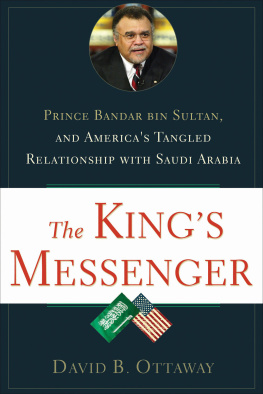
SAUDI, INC.
THE ARABIAN KINGDOMS
PURSUIT OF PROFIT AND POWER
ELLEN R. WALD

SAUDI, INC.
Pegasus Books Ltd.
148 W 37th Street, 13th Floor
New York, NY 10018
Copyright 2018 by Ellen R. Wald
First Pegasus Books edition April 2018
Interior design by Maria Fernandez
All rights reserved. No part of this book may be reproduced in whole or in part without written permission from the publisher, except by reviewers who may quote brief excerpts in connection with a review in a newspaper, magazine, or electronic publication; nor may any part of this book be reproduced, stored in a retrieval system, or transmitted in any form or by any means electronic, mechanical, photocopying, recording, or other, without written permission from the publisher.
Library of Congress Cataloging-in-Publication Data is available.
ISBN: 978-1-68177-660-6
ISBN: 978-1-68177-718-4 (e-book)
Distributed by W. W. Norton & Company
For Sam
CONTENTS
A bdul Aziz woke quickly in the darkness. Around him, men and camels slept in clusters on the cool desert sand. Then just twenty-six years old, Abdul Aziz stretched his long limbs and sat up noiselessly. His hand automatically moved to grasp the musket by his side. Abdul Aziz began this particular day identically to the one that had preceded it.
Together, he and his men ate a light meal before dawn and then prostrated themselves in prayer. The group moved as one, answering the leaders benedictions in perfect unison. They rested in the shade of crudely erected tents, cleaned and polished their weapons, and competed to see who could recite more of the Koran from memory. Abdul Aziz judged their attempts harshly.
For twenty days in the month of Ramadan, Abdul Aziz ibn Saud and two hundred of his cousins, fellow tribesmen, and sympathetic Bedouins camped outdoors in a remote location in the Arabian Desert. The men were waiting for Abdul Aziz to decide when they would attack the city of Riyadh. After nearly three weeks, the Bedouins in his camp were growing restless. They had begun goading each other into increasingly vicious mock swordfights after the iftar meal that broke the fast at nightfall. Abdul Aziz feared he would not be able to contain their fiery tempers much longer.
Riyadh, in 1902, was not an impressive city. Located in the center of the Nejd region of Arabia, its geographic isolation made it an unlikely seat of power. Riyadh sat atop a high plateau, three thousand feet above sea level. From the desolate center of the Arabian Peninsula, the journey just to Mecca took over a week by camel. In 1902, the city had few water resources and no important trading routes to sustain it commercially. In 1902, Mecca was the center of the Islamic world and Istanbul was the political center of the Middle East, but Riyadh was home to Abdul Aziz.
The tribe of al Rashid had captured it from Abdul Azizs father and his tribe, al Saud , a generation earlier. Abdul Azizs father had tried, again and again, to retake the city, but he had failed each time. Finally, in the winter of 1901 and 1902, young Abdul Aziz saw an opportunity. The local Bedouin tribes had become disgruntled with al Rashid rule and rallied eagerly to Abdul Aziz. Impatient, they wanted to march on Riyadh immediately, but Abdul Aziz knew from prior attempts that al Rashid s governor guarded the city diligently. Cautious planning would help win the day, so he gathered supplies and took his restless allies into the desert to observe Ramadan away from the eyes of al Rashid sympathizers who might alert the governor to his intentions. Abdul Aziz dispatched a cousin to spy on the conditions within the city and awaited his return patiently.
On the twentieth day of the month, Abdul Azizs spy returned with intelligence on the city, its fortifications, and the governors schedule. As the sun fell behind the dunes, Abdul Aziz and his men performed their usual ritual of prayer and broke their fast. He ordered the men to gather their weapons and mount their camels. It was time.
Abdul Aziz rode at the head of the group, with a Jezail musket slung across his shoulders. A white thobe billowed out behind him and a shomagh shielded his eyes from blowing sand. A train of similarly clad and armed men followed him across the desert. They traveled quickly through small encampments and oases, stopping briefly only to refresh themselves and their camels. When the band reached the date palm groves that ringed the outskirts of Riyadh, Abdul Aziz had his men dismount and leave their camels by the oasis with a token force guarding them. The rest hurried on foot toward the mud wall protecting the city. At the gardens next to the walls, he instructed six men to quietly cut down a tall date palm and lean it against the wall to use as a ladder. Abdul Aziz and a preselected group of forty men prepared to scale the wall and enter the city. He left the rest of the men under the command of his brother, Mohammad.
If, he said, by tomorrow noon no message has come from me, hurry back to the others and flee together to Kuwait. Tell my father I am dead or prisoner of the Rashidis. He ended with a prayer, There is no power nor strength but from Allah the Exalted. Under the cover of the cold, dark, moonless night, Abdul Aziz and his band climbed up the tree trunk and dropped silently down the wall on the other side. They hurried toward the Rashidi governors house but stopped next door at the house of a shepherd and former al Saud servant named Juwaisir. When Abdul Aziz knocked on the door, he was recognized immediately and invited in with his men. Juwaisir allowed Abdul Aziz and his men to climb to the top of his house and gather on its flat roof, where they jumped onto the roof of the governors house. From there, they climbed through the windows and quickly overpowered the governors wife and her sister and locked them inside a room. As Abdul Azizs spy had reported, the governor feared so much for his own safety that he spent his nights with his bodyguards inside the walled fortress nearby. He returned to his home every morning after dawn.
Abdul Aziz and his men hunkered down to wait until morning. They recited passages from the Koran and sipped strong coffee throughout the rest of the night. Meanwhile, Abdul Aziz sent a scout to bring Mohammad and the other men who had remained outside the walls. He posted guards to watch through the windows for the governors approach. Just before dawn, Abdul Aziz led his men in prayer. According to his intelligence, the Rashidi governor, Ajlan, would soon return to his residence.
Indeed, just after dawn, the Saudis and their men heard the sounds of approaching horses. The governor and his bodyguards! The men tensed with excitement and apprehension at the coming ambush. They heard the wrought-iron lock open with a clank and the great wooden doors swing slowly open. The men waited for Abdul Azizs signal and watched Ajlan step into the dimly lit courtyard. Suddenly, Abdul Aziz himself jumped out from behind a window and ran across the courtyard. Dust flew up in clouds behind him, making it difficult for his men to see exactly what was happening.
Ajlan was so shocked at the sudden attack that he did not draw his sword until Abdul Aziz closed in on him. He was able to recognize the son of his Saudi foe. The men saw the flash of Ajlans sword and heard it meet the barrel of Abdul Azizs rifle. Soon both men were tussling on the ground. Abdul Azizs men fired on the governors bodyguards to keep them from interceding, but the noise woke the garrisoned forces, who quickly joined the battle.
Next page












